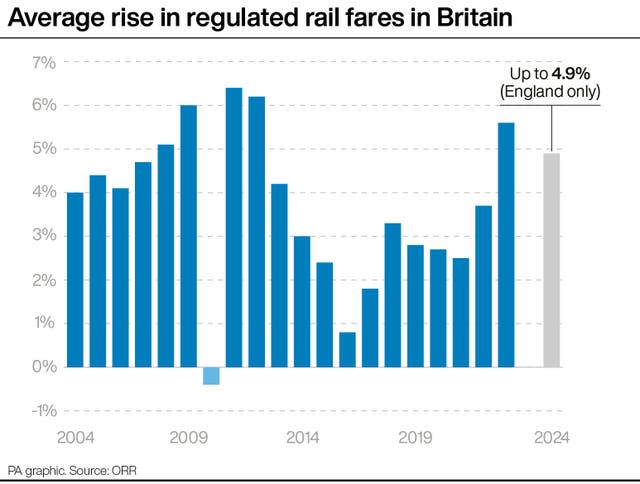Rail fares in England to rise by up to 4.9% in March
Regulated rail fares in England will rise by nearly 5% in March, the Department for Transport (DfT) said.
The DfT has set a cap of 4.9% for increases to most fares regulated by the Government, which include season tickets on most commuter journeys, some off-peak return tickets on long distance routes and flexible tickets for travel around major cities.
July’s Retail Prices Index measure of inflation, which is traditionally used to determine annual fare rises, was 9.0%.

But the Consumer Prices Index (CPI), which is a more commonly used inflation figure, was 3.9% in November.
The previous cap on increases in regulated fares was 5.9%.
Transport Secretary Mark Harper said: “Having met our target of halving inflation across the economy, this is a significant intervention by the Government to cap the increase in rail fares below last year’s rise.
“Changed working patterns after the pandemic mean that our railways are still losing money and require significant subsidies, so this rise strikes a balance to keep our railways running, while not overburdening passengers.
“We remain committed to supporting the rail sector reform outdated working practices to help put it on a sustainable financial footing.”
Fares will rise on March 3.
Michael Solomon Williams, from charity Campaign for Better Transport, said: “We are being asked to be thankful for small mercies, but raising rail fares next year when fuel duty remains frozen sends the wrong message about how we want and need people to travel.
“To tackle air pollution, congestion and climate change, rail travel needs to be an affordable choice, not a luxury.”
Mick Lynch, general secretary of the Rail, Maritime and Transport union (RMT), said: “The Government is presiding over the managed decline of the railways with huge cuts to safety-critical infrastructure spending on one hand whilst allowing privatised train operators to pay out huge shareholder dividends with the other.
“Meanwhile passengers are once again slapped in the face with massive fare increases proving once again what a categorical failure the fragmented privatised system is.”
Rail fares to rise by 4.9%.
We are being asked to be thankful for small mercies, but raising rail fares when fuel duty remains frozen sends the wrong message.
To tackle congestion & climate change, rail needs to be an affordable choice, not a luxury.https://t.co/5aM0OIm0qn
— Campaign for Better Transport (@CBTransport) December 22, 2023
Train operators set unregulated fares, although their decisions are heavily influenced by the Government due to contracts introduced because of the coronavirus pandemic.
Since the railways were privatised in the mid-1990s, regulated fare rises in England were not more than one percentage point above or below RPI until last year.
The DfT said its actions will keep regulated fares more than 9% lower than they would have been if increases matched RPI in the last two years.
The Scottish Government announced on Wednesday that all ScotRail fares will rise by 8.7% from April 1.
No decision has been made on fare rises in Wales.


